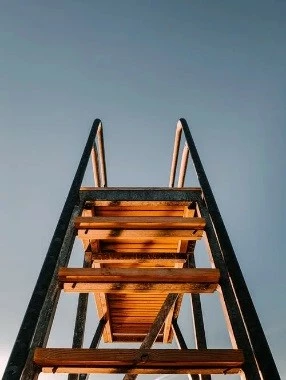Series: July 2020
Category: Gentleness, Patience
Speaker: Rob McClellan

Today's Scripture: Genesis 28:10-19a
10Jacob left Beer-sheba and went toward Haran. 11He came to a certain place and stayed there for the night, because the sun had set. Taking one of the stones of the place, he put it under his head and lay down in that place. 12And he dreamed that there was a ladder set up on the earth, the top of it reaching to heaven; and the angels of God were ascending and descending on it. 13 And the LORD stood beside him and said, “I am the LORD, the God of Abraham your father and the God of Isaac; the land on which you lie I will give to you and to your offspring; 14and your offspring shall be like the dust of the earth, and you shall spread abroad to the west and to the east and to the north and to the south; and all the families of the earth shall be blessed in you and in your offspring. 15Know that I am with you and will keep you wherever you go, and will bring you back to this land; for I will not leave you until I have done what I have promised you.” 16Then Jacob woke from his sleep and said, “Surely the LORD is in this place — and I did not know it!” 17And he was afraid, and said, “How awesome is this place! This is none other than the house of God, and this is the gate of heaven.”
18So Jacob rose early in the morning, and he took the stone that he had put under his head and set it up for a pillar and poured oil on the top of it. 19aHe called that place Bethel; THIS IS HOLY WISDOM, HOLY WORD. THANKS BE TO GOD. AMEN.
The Nearness of You
Last week during some “staycation” days, I found a few moments to lie in a hammock we strung between two trees behind our home. I recommend this. There’s nothing like looking up through the branches of a tree. If you haven’t done it in a while, try it. Take it as a prescription if that gives it more legitimacy. We’re supposed to be listening to doctors right now. Okay, so I don’t have that kind of doctorate, but trust me; it’s for your own good.
In the biblical languages, the same words are used for sky and heavens. It’s easy to see why. Staring up at the sky is kind of a transcendent experience. We long to connect to something greater. Don’t think I don’t know that you all stare up at the ceiling when you’re in here. Sanctuaries have steeples that point up for a reason. We long to bridge heaven and earth.
Those images of staring up at the heavens through the tree from my hammock were in my mind when I returned to the passage this week and what was it, the story in Genesis where Jacob lies down outside and dreams of a ladder stretching from earth to heaven. You can’t make this up. There are a several aspects of this image worth noting in light of our present reality. Sojourning, Jacob uses a stone to rest his head. Now, I know we, on the other hand, are stuck largely at home, but we too are sojourning in a way that feels displaced. Our pillows may be softer, but are we not trying to rest among the stones these days?
Next, Jacob has his vision in his dreams. Many of us don’t take our dreams as seriously as other cultures, nor do we the importance of time for rest and reflection. We have somehow deemed those as indicators of weakness, when in fact they are necessary ingredients of the creative, moral, and intentional life because they make space for greater wisdom to enter in. We instead are fed a steady hollow diet of messages and tools to keep us mindlessly busy, choking off access to our dream spaces, where, if you take Scripture seriously, God speaks. Have you ever kept a dream journal? You might be surprised what you might discover there.
Maybe most importantly, notice who travels up and down the ladder and who does not. It’s the angels. We don’t talk about them much in our tradition, which is our loss if you ask me. Have you ever met an angel? God, on the other hand, is planted firmly on earth, right beside Jacob. That’s powerful. The psalm for today tells of the same reality, that there is nowhere to go, says the psalmist, to escape from the presence of God. It’s a familiar and beloved psalm to many, “O Lord, you have searched me and known me…Where can I go from your spirit...” We expect God to reside in heaven. That’s how we pray. That’s how we act. That’s what we’ve been taught. Christians have sometimes made the error that God only lives in the text, when the text testifies time and again that God lives in the world. We need to relearn how to recognize it. I say relearn because we have it in us, but somewhere along the way we forgot how. In her book, aptly titled, An Altar in the World, Barbara Brown Taylor writes:
People encounter God under shady oak trees, on riverbanks, at the tops of mountains, and in long stretches of barren wilderness. God shows up in whirlwinds, starry skies, burning bushes, and perfect strangers. When people want to know more about God, the son of God tells them to pay attention to the lilies of the field and the birds of the air, to women kneading bread and workers lining up for their pay. Whoever wrote this stuff believed that people could learn as much about the ways of God from paying attention to the world as they could from paying attention to scripture.[1]
Do we believe that? Planted deep within our tradition is a mistrust of our experience, yet every doctrine or teaching we are told to accept started as an experience by someone. If I asked, “Where do you see God?” we might be uncomfortable by how easily some answer, but perhaps we should be similarly concerned by those who could take all the time in the world and not have an answer…of course if they took such time, they surely would be given an answer. If it helps, I can appreciate the suspicion of the rogue individual claiming access and direction from God, but from the beginning we have had checks on such claims. That’s why we have spiritual community. What if brought the same attention and intention into our lived experiences as we do to the study of our texts or source of wisdom in this life?
I wonder what personal peace and clarity we would find. Those sound pretty good about now. How many months into this are we now? When I first began taking notes for this sermon, during worship planning, the pandemic was just beginning. I assumed by now we’d be looking back on it, but now we find ourselves seemingly back to square one, feeling as though all that sacrifice was for naught. Wouldn’t it be helpful to cultivate an ability to recognize God in the midst of this? This is going to be a long and potentially lonely road. It would be good to learn to make altars along the way. For you hikers or bikers, think of the stone piles you see along the trails. Let that be an image for how you move through the world, building little reminders to notice and honor the sacred in your midst.
This is not just a practice that will be ourselves; it will shape our we relate to others. That is the whole point, right? Faith is not lived in a vacuum, but a real world. Our world could use a few more altars, those at which anyone could kneel and notice the presence of God. What we have is a world we’ve deemed largely profane. Have you seen these awful videos of people throwing tantrums in stores or out in public over not wearing masks, or calling the police on their neighbors or people of color for no good reason? There’s so much rage out there, and not over the things that do, in fact, deserve our rage. What righteously enrages people is the treatment of some not as equals, much less sacred creations.
Have you ever heard the stories of Buddhist monks ordaining trees, deeming them as sacred, so they cannot be cut down? What if we took that image as a guide as well and went through the world ordaining that which is around us so it couldn’t be desecrated. We’ve lost the ability to build altars in the world. We’ve instead grown accustomed to treating so much of the world as profane, disposable, and each other the same. That’s the only way you could take bread in the grocery story and throw it on the ground, bread, in a world where thousands of people die every day from hunger, and throw it on the ground, bread, with which Jesus identified and offered salvation to the world, and throw it on the ground. Nothing points to God or the sacred, or the valuable, or the shared. Everything is affront to me, an inconvenience to me, doesn’t serve me. We have become our own reference point for everything, rather than the greater whole and the greater One from whom all blessings flow.
When we build altars in the world, we start to see the ground we’re on as holy, and the space between us as sacred, and the care for others as, well, doesn’t scripture describe this as care for angels?
When I did a rotation at a large trauma hospital, the chaplain used to describe it as “the gates of heaven,” because for so many people it was the last place they were on earth. It was a beautiful description, but Jacob’s dream story shows us that the gates of heaven are not just there to await our death, wherever we put our stones down and make an altar and resting place, the gates of heaven open.
Do you know what’s behind me? It’s not an altar. People make that mistake all the time in referring to it as one. It’s a communion table and simply a chancel shelf, where we set the flowers. Now our fore-bearers didn’t call it an altar because we don’t consider communion a sacrifice; it’s a common meal. Maybe we should also resist calling it an altar, because what we need is not more altars in churches, but more altars in the world. So try it out. Start at home and stretch your boundaries farther and farther out. It may be just what the doctor ordered. Amen.
[1] Barbara Brown Taylor, An Altar in the World.
